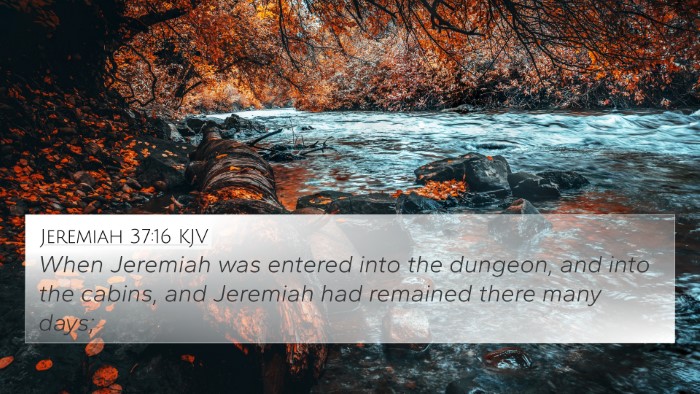Understanding Lamentations 3:53
The verse Lamentations 3:53 states, "They have cut off my life in the dungeon and cast a stone upon me."
This poignant expression encapsulates deep sorrow and a sense of despair following the destruction of Jerusalem and
the suffering experienced by its people. The author, traditionally identified as the prophet Jeremiah, vividly
portrays the pain and isolation he feels. In analyzing this verse, we can draw insights from various public domain
commentaries, highlighting its significance.
Contextual Background
Before delving into the rich meanings within this verse, it’s essential to understand the context of Lamentations,
a book attributed to Jeremiah following the Babylonian exile. The poet uses this deeply emotional lament to convey
the tragedy of the fall of Jerusalem and the immense suffering of its inhabitants. This backdrop is crucial for
appreciating the depth of suffering encapsulated in verse 53.
Commentary Insights
-
Matthew Henry:
Henry emphasizes the metaphorical 'dungeon' as a place of despair, symbolizing not only physical captivity
but spiritual desolation. The 'stone' metaphorically signifies the weight of despair and the finality of
judgment, echoing the sense of hopelessness faced during this tumultuous time.
-
Albert Barnes:
Barnes interprets the 'stone' to reflect the heavy burden imposed by enemies. He notes that the persecution
from external forces leads to internal desolation, underscoring the interplay between physical hardship and
emotional suffering experienced by those devastated by war and famine.
-
Adam Clarke:
Clarke discusses the implications of being 'cut off' from life, which can relate to both physical death and
spiritual demise. He highlights the depth of Jeremiah's anguish, suggesting that this verse serves as a
cry for divine intervention amidst overwhelming strife, illustrating the connection between suffering and
the need for divine solace.
Thematic Connections
Lamentations 3:53 resonates with several Biblical themes such as suffering, hope, and divine justice. It serves as
a bridge connecting various concepts throughout Scripture. Notable thematic connections include:
- Isolation and Despair: Reference to Psalm 69:14-15, where the psalmist also expresses feelings
of abandonment and distress.
- Divine Justice: Links to Romans 12:19, where believers are assured that God will repay those
who cause suffering.
- Hope Amid Suffering: Echoes 2 Corinthians 1:3-4, which speaks of God comforting us in our
tribulations.
- Judgment and Consequences: Related to Ezekiel 18:30, where the need for repentance is emphasized.
- Spiritual Warfare: Connects to Ephesians 6:12 discussing the struggle against spiritual forces.
- Endurance in Trials: Resonates with James 1:2-4, highlighting the purpose and growth through suffering.
- Hope in Restoration: Links to Jeremiah 29:11, which reassures of God's plans for a future filled
with hope.
Bible Verse Cross-References
When examining Lamentations 3:53 through the lens of cross-referencing Biblical texts, we discover several ways
in which this verse connects to other scriptures:
- Lamentations 3:54: Continues the theme of despair, emphasizing the bleakness felt by Jeremiah.
- Psalm 88:6-7: Reflects a similar depth of anguish and isolation, underscoring the intensity of
suffering.
- Job 30:19-20: Job and Jeremiah share expressions of suffering and calling out to God for relief.
- Isaiah 53:3: The suffering servant, paralleling Jeremiah’s mistreatment and sorrow.
- Revelation 21:4: A promise of future hope where sorrow will be no more, contrasting the despair
in Lamentations.
- Matthew 5:4: The beatitude that assures comfort for those who mourn, resonating with Jeremiah's lament.
- Philippians 4:6-7: Encouragement to present anxieties to God for peace, a contrast to Jeremiah's despair.
Conclusion
Lamentations 3:53 serves as a powerful reminder of the realities of suffering and isolation. It speaks not only to
the historical experience of Jeremiah but also to the universal themes of human desolation and the longing for
divine intervention. By exploring cross-references and thematic connections within the Bible, readers can find
solace and hope amid suffering, reminding them of God's abiding presence.









